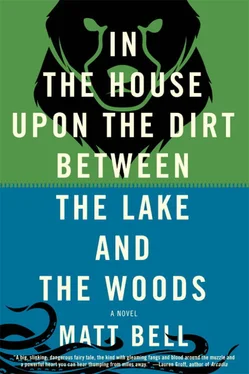My next transformation was not about a mouth that became a beak, was not merely arms and legs that became tentacles thickened with hooks and suckers. Even the eyes of squid were not pathed as the eyes of men, and so new-sighted mechanisms had to be made in this instant, a second long enough. I was adept now at making do with what time there was, and so here there was time enough for one last plan, the quick purposing of my new body, the filling of it with its task: to kill this bear, this mother I pitied but whom the rules of this world would not let me save; who had frustrated me for so long; who had tried to kill me and had killed the foundling instead; whom I too had hurt, but whose forgiveness I could not earn.
And what was the fingerling’s role in this fight, and whose side would he take?
Perhaps he had imagined he would be able to again frustrate me, but now it was I who frustrated him, with a body made strange, its hollows unfamiliar tunnels: If he lived part of his life in my spleen, where would he go now that I had no spleen? Where were my new lungs, my new gall bladder, my new arms and legs? For the fingerling, who had besieged my bones to bending, where was there to go when I had no bones?
Only one place, a chamber clenched.
The squid had reshaped my body but it was not all a part of me, and so I too was a passenger or else a pilot, as the fingerling had been between my bones, and while the squid first jetted toward the center of the lake, away from the bear, it soon began the long arc back, by my command. The bear was still bellowing through the shallows when we struck her the first time, raking a hooked tentacle from out the water and across her bony trap-scarred snout, and she howled in pain or frustration. The squid pressed, circled, pressed again, put our hooked and barbed tentacles to their use, all our arms with more reach than even the bear’s own long grasp, and also with a beak the equal of her mouth, if not its better, the bear’s now loose of tooth and weak of jaw, but still the squid did not bring our full fight upon her, not while she was able to stand in the low water. Instead we pulled and tore her flesh, her facing flank, and with quick blows we lured her on, and when she began to falter and to wail only then did we taunt her failing courage with the shrouded shape of her once-cub, the foundling pushed out into the lake, floating bloated upon the surface and waiting to be claimed.
How the bear bellowed then! Grayest water shook from off her roaring head, her bone mantle glistening in the false light sparkling all the surface of my wife’s new-sung world, and then the bear charged into the deeper water, fast again, fast as she had moved between the trees of her own woods. When her feet left the lake floor, without hesitation she swam on, her armored legs pumping beneath the water, churning her path as she struggled to keep her snout above the surface, pointed at the floating shroud still out of reach. The water was deep and cold, deeper and colder than its small circumference suggested, and into those depths the squid dove, and from those depths we rose again to strike at the bear, to rake our hooks across her belly, the bones of her armor, and despite those gouges we could do no real harm, would never except in that space the fingerling had shown me, that bone-bare stretch of her throat that we could not yet reach. As the bear swam, the squid frustrated her with our speed, with our ability to attack then quickly retreat, moving from her floundering shape to the floating body of the foundling, and there was no danger to me then, so deep inside: From this new station I was never once afraid of the bear, as I had been on the dirt and in the woods and in the house. All my years upon the dirt the bear had seemed to master me, and now I would master her.
As we fought, the fingerling moved within the corridors of the squid shape, assuming new posts and positions, and as the squid swam around the bear so also the fingerling was set in motion inside that movement, testing every space. The fingerling approached an organ much like the stomach he had claimed, and when he was wormed deep inside that clenched and puckered sac, then at my command the squid charged up through the depths toward the struggling bear, and there I said goodbye, goodbye to son and ghost, goodbye to bear and other-mother, other-wife who was never mine, and if they did not wholly deserve this end they got, at least they were ended, and what mercy I believed that was: To steer the squid to swim before the bear, leading her on, then to turn our body back. To feel the squid release into the water the contents of our ink sac like a fist opening, the unfolding of a hand holding some smoky darkness, holding blackness, my blackness, yes, all that ghost I had named the fingerling when it deserved no other name, and now that son, caught there in that organ, and now that son expelled at last, swimming out into obfuscation, into a cloud of camouflage, into a cloud of grief through which the squid swam, my past floating outside our body, and still I felt nothing, still I saw with the dispassionate yellow gaze of the squid—or else how could I have done what I did—and the voice and the voices of my only son surrounded us, made a cloud that was not just ink, and in it the squid saw everything and the bear saw nothing, and the water churned with the stuff of our ink and the unmakings of the fingerling, torn and threaded by the sharp slimness of that expelling orifice, and as this animated ink he floated in streaks and flumes around the bear, whose mouth filled when she growled to smell him, the clotted stink of something rotten unbirthed, gestated too long.
The squid was a hunter and a trapper too, and I was the squid, and the squid was me, and we shot through the ink toward the bear, searching for that thin breadth of bone-spaced chance, and as we jetted through that horror I heard the fingerling’s voice call out to me, call out in many voices for me to save him, to take him back in, begging as only a child can beg. Despite his treacheries he was sometimes somehow still a baby boy, and had I been a man his drowning might have undone the taut strings with which I had shut my heart.
As a squid?
As a squid I saw only a food we would not eat, flesh of my flesh, poison if I made the same mistake again. His blackness streamed around us, but all the squid cared was how it hid our long shape, masked our sharp scent. We swam the wet length of our clouded boy, and when the squid reached the bear we sought again to strike her where she needed to be struck, and against us and against the fingerling the bear struggled to surface, her mouth and eyes and ears filling with the bodies of my son, with the minnowed shapes of him. And what shapes they were! Not just ink and boy but already hunger and hatred clumping, solidifying, becoming new shapes, new forms of ancient and angry swimmers, each frustrating the bear, then tearing at her eyes, then dismantling the last solid sockets of her jaw, then eating her tongue from out her mouth.
Soon the bear was blind and belligerent, confused so that she did not know up or down, and the squid circled her flailing once, twice, amid the ink. I wanted to speak to her, to reach out and say some parting words—to say sorry, sorry again—but the squid did not have the same brain as a man, nor the same vocal cords, and without the fingerling I could not have translated her replies, and anyway what right words were there to say.
The squid dragged our hooks across the bear’s stomach, this time breaking her weakened bones across new perforations, leaving furrows for the black ghosts of the fingerling to crack wider, and when that succeeded we laid down more cuts, across the hump of the shoulders and both halves of the hips, across the plates of the bear’s back and head. I needed the squid to strike the throat, craved that hit, but could not help my marveling at our thoroughness, the glory of this hunter’s shape, so different from my trapper’s form upon the land, for the squid was an exquisite killing machine and within it I an exquisite killer. The ghosts of the fingerling hungered, desperate outside my strong-shelled body, and with no other source in the empty lake they redoubled their attack on the bear, tore strings of marrow from out her bones, and with them they grew quickly larger, shaped more like fish, then more like eels. Black scaled and dark slimed, they wiggled in and out of the bear’s armor, and when they slipped away it was with gulping throats, bloated stomachs.
Читать дальше












